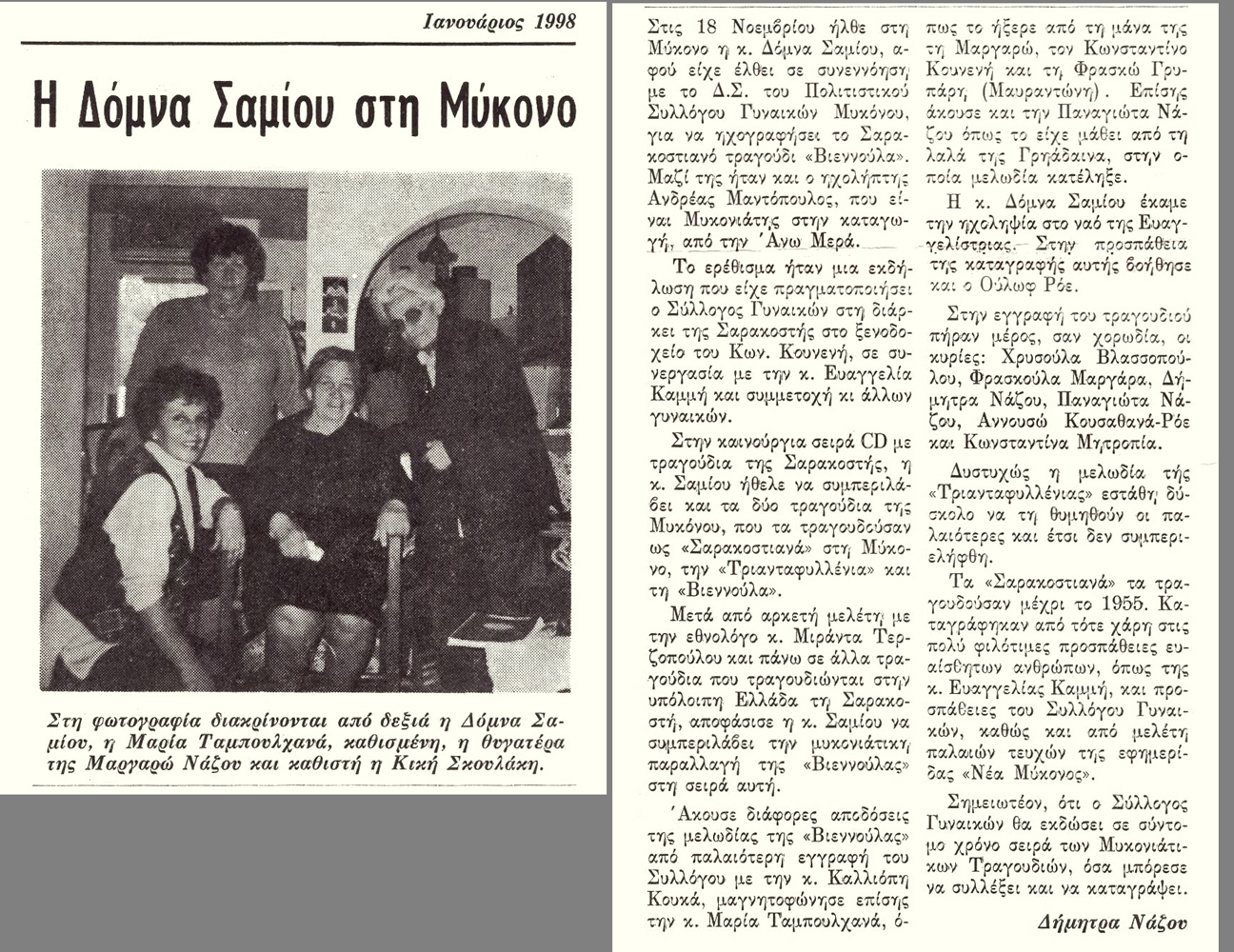00:00
Home / Her Work / Song Catalogue / Evyenoula
Young Evyenoula, comely lass, the lass who married early
and boastfully was wont to say that Charon would not get her,
because her home stood proud and tall, her husband was so manly,
because of brothers she had twelve and eighteen brothers-in-law.
Now when old Charon heard of this, he took it very badly,
and in the guise of a white bird —for he was a black swallow—
he went and sunk his claws in her and clung to her left bosom.
“O mother, how my head does spin, my heart is painful, mother.
O mother, make my bed for me, I’ll lay me down and die there.
When Konstantis comes back, mother, make sure you don’t upset him.
Just set the table for his meal and see he gets his supper,
give him a jug of sweet red wine to put him in good humour”.
She’d hardly finished saying this that Konstantis strode homewards.
He saw the black cross on his door and priests about the courtyard,
he saw the sexton with his spade, the grave that he was digging.
“Hello there, sexton! What’s afoot? Whose grave is that you’re digging?”
“I cannot find the words to say, nor yet the tongue to speak them,
nor have I got the heart or mind to tell you who it’s dug for.
Young Evyenoula is the one, the lass who married early
and boastfully was wont to say that Charon would not get her
because her home stood proud and tall, her husband was so manly,
because of brothers she had twelve and eighteen brothers-in-law”.
“Why, sexton if that’s so, then see you make the grave a twosome,
just dig it deep and dig it wide, and dig it for a couple,
for Evyenoula the young lass, and for her Konstantakis,
a mere youth he was who married early.
And by the pillow ’neath our hands leave us a little window,
so that the birds may come and go, the stars look in upon us,
then of those corpses folk will say they died for no good reason,
while cruel fate kept them apart, old Charon did unite them”.
Translated by John Leatham
Μα η Βγενούλα η μικρή, η μικροπαντρεμένη,
όπου καυχιόταν κι έλεγε πως Χάρος δεν την παίρνει,
γιατί είν’ τα σπίτια της ψηλά κι άντρας της παλληκάρι,
γιατί έχει δώδεκα αδελφούς και δεκαοχτώ κουνιάδοι.
Κι ο Χάρος όντας τ’ άκουσε, πολύ του κακοφάνη,
άσπρο πουλάκι γίνηκε, μαύρο χελιδονάκι,
και πήγε και τη γκίλωσε μες στο ζερβί βυζάκι.
«Μάνα, το κεφαλάκι μου, μάνα, πονεί η καρδιά μου,
στρώσε, μάνα, την κλίνη μου να πέσω να πεθάνω.
Μάνα, σαν έρθει ο Κωσταντής, μην τον κακοκαρδίσεις.
Στρώσε του τάβλα να γευτεί και τάβλα να δειπνήσει,
βάλε του και γλυκό κρασί για να καλοκαρδίσει».
Ακόμα ο λόος ήστεκε κι ο Κωσταντής μπροβαίνει,
βλέπει σταυρό στην πόρτα του, παπάδες στην αυλή του,
βλέπει τον πρωτομάστορα να σκάβει το μνημούρι.
«Να ζήσεις, πρωτομάστορα, ποιανού ’ναι το μνημούρι;»
«Δεν έχω στόμα να σ’ το πω, χείλη να σ’ το μιλήσω,
κι ούτ’ η καρδιά μου με βαστά να σου το μολογήσω.
Είν’ τση Βγενούλας τση μικρής, τση μικροπαντρεμένης,
όπου καυχιόταν κι έλεγε πως Χάρος δεν την παίρνει,
γιατί είν’ τα σπίτια της ψηλά κι άντρας τση παλληκάρι,
γιατί έχει δώδεκα αδελφούς και δεκαοχτώ κουνιάδοι».
«Να ζήσεις, πρωτομάστορα, σκάψε βαθιά το μνήμα,
σκάψε βαθιά, σκάψε ανοιχτά, σκάψε για δυο νομάτοι,
για τη Βγενούλα τη μικρή και για το Κωσταντάκι,
το μικρό το μικροπαντρεμένο·
και στο προσκεφαλάκι μας άσε παραθυράκι
να μπαινοβγαίνουν τα πουλιά, να μπαινοβγαίνουν τ’ άστρα,
να λεν για τούτα τα κορμιά τα αδικοχαμένα,
όπου τα χώρισε η ζωή και τα ’σμιξεν ο Χάρος».
In the island of Mykonos, women used to sing certain songs throughout the Lenten period, during which all other forms of entertainment were banned. These Lenten songs were not like songs sung for amusement. Their content —imbued with sorrow, bitterness, subjection, exile, loss and death— aligned, though not strictly religious in nature, with the spirit and emotions of the season: a time of mourning and reflection. They spoke of everyday human suffering, of life’s confrontation with death. They were songs of distant lands and of Charon, but also of love — especially of faith in love.
Most of them are now forgotten — or their purpose has been. Among them were Erasmia, The Girl with Rosy Cheeks, The Lissom One and Kostantakis, but the best known of all was Evyenoula.
Miranda Terzopoulou (1998)
Studio recording (1997). Based on Domna Samiou’s field recording of the song, made in November 1997 in Mykonos, sung by Panagiota Nazou.


Singers

Informant (source of the song)